Published texts by individual authors reflect exclusively their opinions rather than those of the editing editors and publishing platforms
Author: Simon Jacob
Place: USA, Chicago, Illinois
Format: Diary narrative
Topic: Society
Date: 20th of September 2023
Portal: zocd.org, peacemaker-tour.com
Text duration: 10 minutes
Language: English
Title: Sweet Maple - Cafe of Cultures in the United States of America
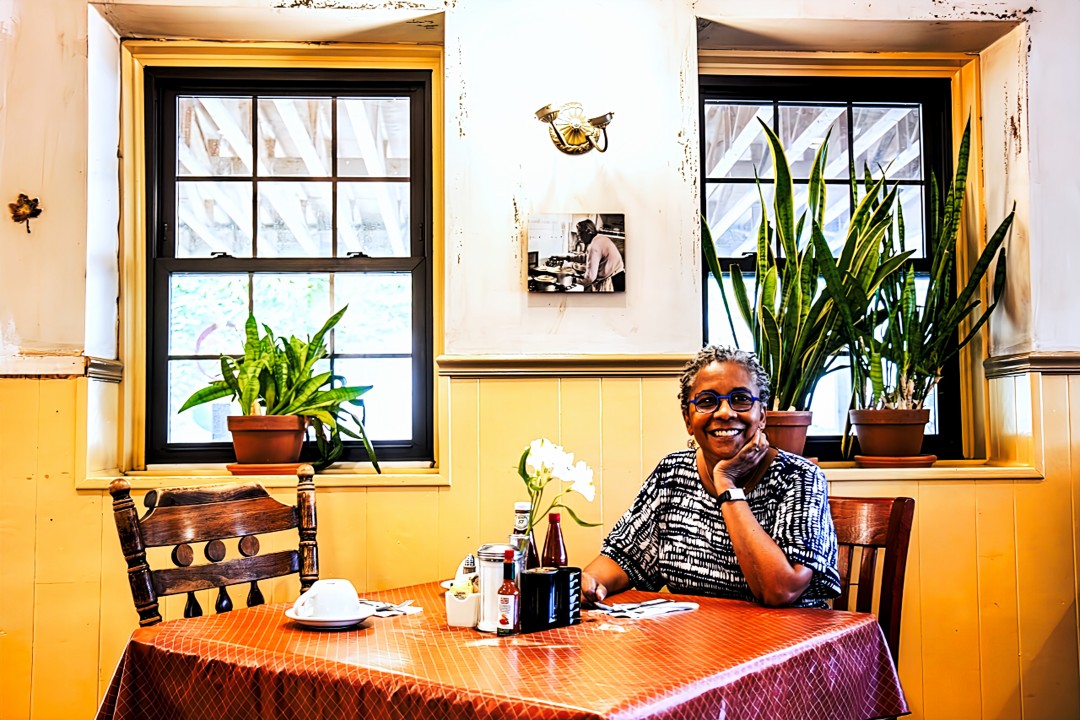
Simon Jacob: Laurene, 20.09.23 Chicago
Sweet Maple - Cafe of Cultures in the United States of America
How do you describe a topic that has occupied you for years? Based on my view of humanity, I simply see people as people, regardless of skin color, culture, religion or sexual orientation. According to my Christian world view, there are no first, second or third class people. People are human beings and citizens at the same time. The socio-cultural environment, access to education, security, personal possessions and participation in political and cultural life determine a person's position and social status. Or at least they should in an ideal and homogeneous environment where everyone has the same opportunities. But unfortunately, prejudice against others exists in the United States, no matter how hard they work. In the microcosm of different social classes, parallel structures have formed that live side by side rather than together. In my observation, this is often not even intentional. The average US citizen works hard from Monday to Friday. At the weekend, they devote themselves to shopping, necessary errands, leisure activities such as sporting events, concerts or visits to restaurants, or spend a lot of time looking after their children. If there is still time left, especially on Sundays, many members of different religious communities go to church, to the synagogue (on Saturdays) or to the mosque (on Fridays), and so on. Although the number of people who do not belong to any religion is constantly growing, according to a survey by Statista, 70% of Americans will still describe themselves as religious in 2020/2021. This has implications for the political consensus of the two leading parties, Republicans and Democrats. Religion can both contribute to the cohesion of society and lead to its division when religious views become radicalized, as is occasionally the case in the US.
The fragmentation of society in the USA seems to me to be much deeper than in Germany. In addition to the fact that middle-class US citizens often have little time to visit other neighborhoods where African Americans, Asians or Indians live due to their workloads, it is fears coupled with stereotypical thinking that prevent different social classes from exchanging ideas and getting to know each other better. The African-American community, once exploited as slaves on the plantations of the South and considered second-class people, seems to be particularly affected. Interestingly, African-Americans who have only immigrated to the US in recent decades are, according to various interviewees, more successful than native-born African-Americans. Against this background, I try to understand the difficult situation of African-American society as objectively and rationally as possible.
The civil rights movement in the USA
Until the 1960s, the lives of African-American citizens in the USA were characterized by racial segregation. Although slavery was abolished in the southern states at the end of the Civil War in 1865, this did not automatically mean that the former slaves received full civil rights. Racial segregation determined the rights of "whites" and "blacks" in public and private life. Citizens of color were at a considerable disadvantage. For example, sexual contact between "whites" and "blacks" was forbidden and marriages between them were prohibited. In restaurants, theaters, schools and other public institutions, there were separate areas where non-whites were at a considerable disadvantage. On public transportation, there were reserved seats for whites only, while African Americans had to make do with inadequate seating. The same applied to the indigenous population, who were seen as inferior when the continent was settled, and to the Chinese immigrants, who were instrumental in building the infrastructure and were pushed into separate neighborhoods known today as "Chinatowns" by the "Chinese Exclusion Act".
This situation only changed in the 1960s with the civil rights movement, which was led by Martin Luther King and supported by personalities such as Booker T. Washington, W.E.B. Du Bois, Thurgood Marshall and, above all, Rosa Parks. The story of Rosa Parks deserves its own article. Martin Luther King, inspired by Mahatma Gandhi, advocated non-violent resistance against oppression and social injustice. He called for resistance against the discrimination of the black population in the southern states and justified this with the Christian canon of values, which emphasizes the equality of all people regardless of their skin color. King was later murdered during his active political activities. His legacy and that of many other activists ultimately led to civil rights reforms in the USA at the end of the 1960s. Racial segregation was abolished and African Americans and other non-white groups were granted full civil rights.
Today, many decades later, the effects of the movement initiated by Martin Luther King do not seem to have completely faded. Differences and injustices, characterized by fears on both sides, continue to dominate social discourse. The Black Lives Matter movement is just one symptom of events that have not yet been fully addressed, the roots of which lie in the enslavement of those who worked on the plantations of white owners in order to increase the profits of those who acted inhumanely.
Hello Laurene... 2022
It was a beautiful late summer day in September 2022 in Chicago. I had just returned from our honeymoon in the USA, which had taken my wife Leena and me through Illinois and Missouri all the way to Kentucky. My newlywed wife still had a lot of errands to run, so I used the remaining time in Chicago to stroll around a bit. Even as a child, I loved exploring my hometown on foot or by bike and discovering hidden nooks and crannies. My curiosity knew no bounds and that hasn't changed as an adult.
In the Near West Side, I went in search of motifs with my trusty Canon 6D camera. I am particularly fascinated by graffiti, which I am passionate about photographing, even in war zones. The artistic representation with the spray can always reflects the emotional world of a neighborhood, whether it's a Latin American ghetto in Los Angeles, Baghdad, Qamishli in Syria or Chicago. The search for impressions made me hungry, especially if I hadn't eaten breakfast. So, attracted by the interesting façade design, I discovered the "Sweet Maple Cafe" on Taylor Street. Even then, I wrote an article about the café and its owner Laurene, who fascinated me. When you enter the café, you feel transported to another time. I was reminded of Mark Twain's adventures of Huckleberry Finn and Tom Sawyer. I was particularly struck by the fact that people from different backgrounds, cultures and sexual orientations enjoy their work at the Sweet Maple Cafe. The guests, who were represented in large numbers, couldn't have been more different either.
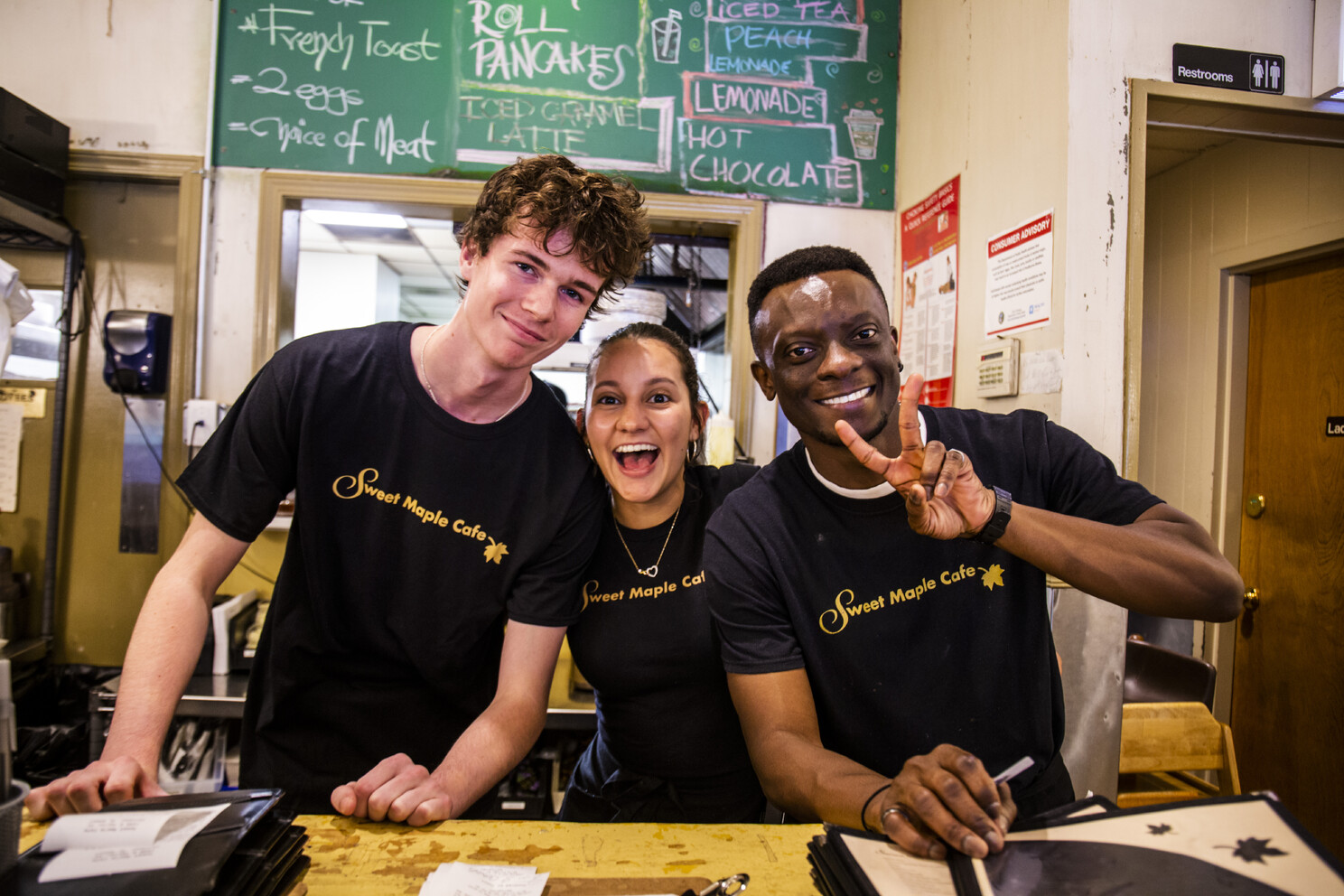
Simon Jacob: Sweet Maple Cafe employee, 09/20/2013 Chicago
Driven by curiosity, back in 2022, I asked the staff directly for the owner of this diverse place for sweet and delicious breakfast. I was introduced to a dark-skinned woman who immediately captivated and fascinated me.
"Hello, I'm Laurene," she said with a few open words and an infectious smile that has stayed with me to this day.
I'm back, Laurene... 2023
As already mentioned, I published a short article about Laurene and the Sweet Maple Cafe in 2022. The contact between me and this great chef and cafe owner has never been broken. We exchanged stories about German cheesecake and how in my home country (Germany) they use quark for cheesecake (which is unheard of in the US) and in the US they use "cream cheese". We just hit it off. As my wife Leena and I were planning to travel to the USA again in September 2023, I announced another visit to the Sweet Maple Cafe. Laurene accepted my invitation with great pleasure. At the same time, I let her know that this time I was not interested in the excellent breakfast in her café, but in her as the creator of an almost magical place where people from different backgrounds and identities come together.
So on September 20, 2023, I visited this remarkable woman again, who enchants with her smile and who you would think could conjure up the best cakes, muffins and crêpes in the world.
In my interview with her, I also asked very personal questions that many people in the USA don't dare to ask. Maybe it's because I grew up in Germany, where it's taken for granted to ask politely if you're interested in something or don't understand the context. Especially when it comes to African-Americans, I was repeatedly told that certain topics were taboo. "Why can't I ask that?" I asked again and again. The answer was unsatisfactory. Again and again I was told that it was better not to bring it up because it could cause conflict, anger, rage or dissatisfaction. But you can't solve problems without asking questions. A democracy must be able to withstand verbal exchange in a diverse environment like Laurene's Café.
What's up, Laurene?
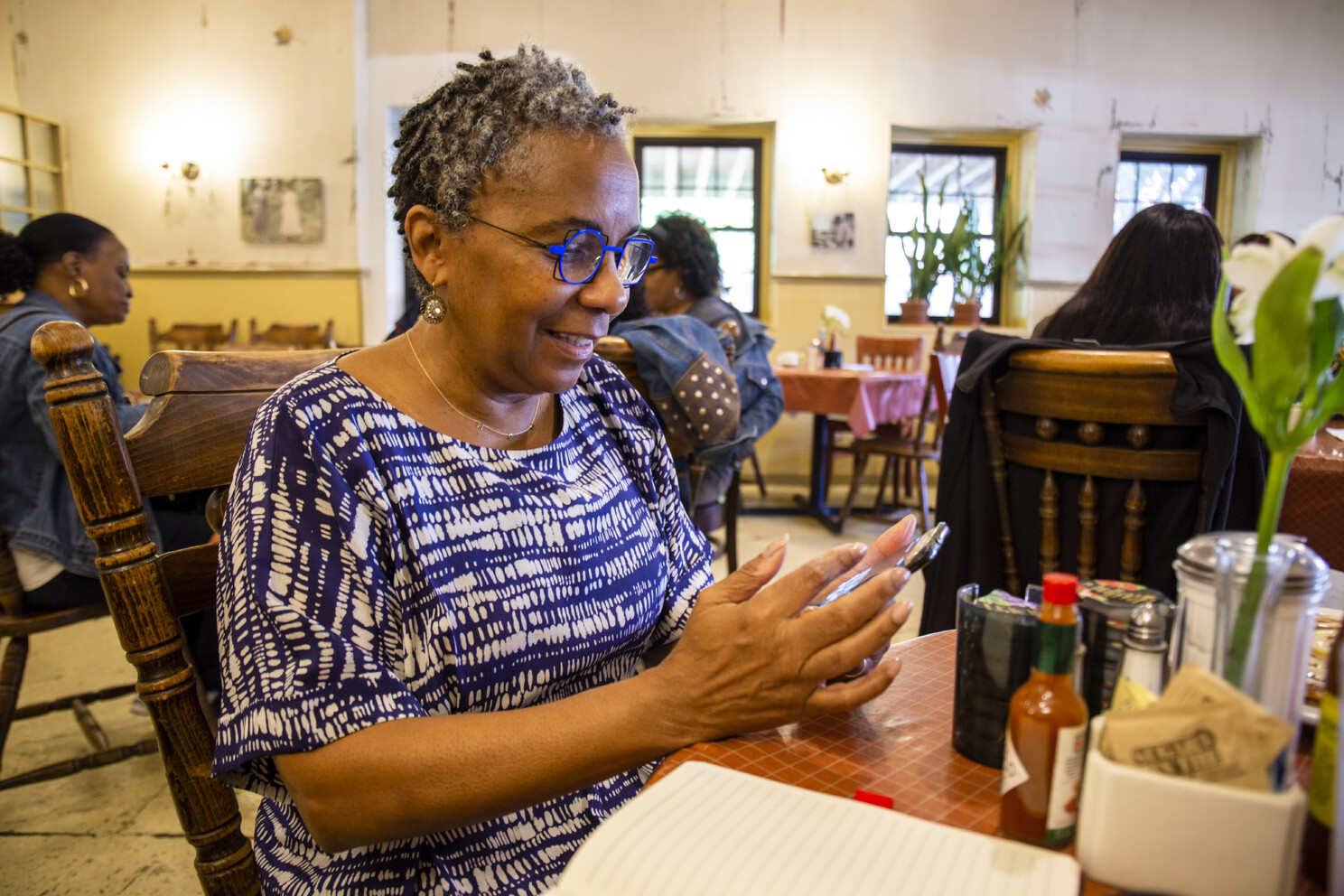
Simon Jacob: Interview with Laurene at Sweet Maple Cafe, 09/20/2013 Chicago
Laurene, born in 1956, grew up at a time when the civil rights movement, shaped by personalities such as Martin Luther King, Rosa Parks, Thurgood Marshall, Booker T. Washington and many others, first had to be integrated into society. It was not an easy time, because this process was characterized by upheavals. Laurene recounted, for example, how as a child she moved into a neighborhood where mainly white people had previously lived. Over time, the whites moved away and she only knew people of African-American origin in her neighborhood. As a child, she assumed that the whole world was populated mainly by people of African-American descent. She also talked about her school days, when she came into contact with other minorities and became part of a changing world. It was a time when racial segregation was omnipresent and still is to some extent, she told me.
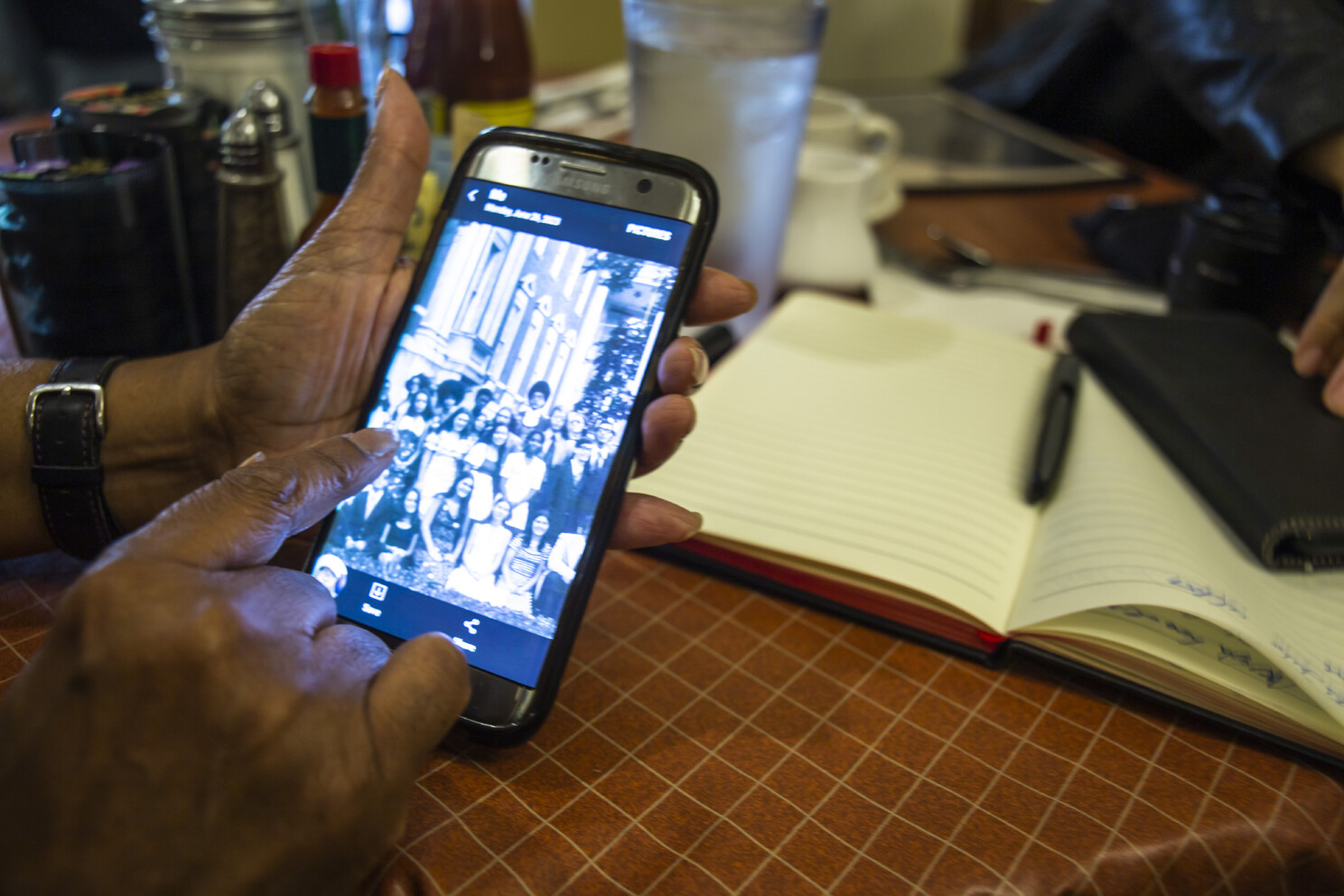
Simon Jacob: Laurene shows me pictures from her school days, 20/09/2013 Chicago
When I asked her why we still have segregation in 2023, she explained that fear plays a major role. Black people are afraid to go to white middle-class neighborhoods because they fear being under special surveillance there. The way the police treat African-Americans in particular causes unease. To make matters worse, it has happened in recent years that residents have shot "colored" people because they thought they were burglars. The fate of a 16-year-old black teenager from Kansas City, Missouri, who accidentally rang the wrong doorbell in April this year (2023) and was shot dead by the 80-year-old homeowner, went around the world. After questioning the shooter, he stated that he had not acted out of racist motives, but was afraid of the young African-American's appearance. Whites, on the other hand, do not dare enter black neighborhoods for fear of being attacked. And indeed, in certain neighborhoods where there are practically no non-whites, the fear of entering these neighborhoods is very great. I was repeatedly told, especially as a tourist, that I should avoid certain neighborhoods. Hispanics and blacks also distrusted each other and did not go into the respective neighborhoods because gang conflicts could lead to violence. Asians avoided certain areas for fear of becoming victims of criminals. Of course, these were extreme examples that Laurene described to me, but she tried to describe the core of what has constituted segregation, or "segregation" as she calls it, since her childhood and still does today: the fear of the other, the unknown, the fellow citizen you talk about without talking to. Negative news, inflated and enriched by fake news and half-truths on the internet, reinforces this mistrust and divides society. The result is that groups and communities avoid each other without making any attempt to get to know each other.
From my personal experience, including in my circle of friends and my own community in the US, I unfortunately have to agree with Laurene. Time and time again, I have experienced things that made me feel deeply insecure and caused me to look more closely at prejudice against people of color, Asians, Latinos, Jews and others. These prejudices were often expressed without really knowing the groups in question. Unless you had no choice but to get to know each other because you lived in the same part of town. In such cases, attitudes towards others often changed. And that is exactly what this remarkable woman, who is also an excellent cook, has unknowingly achieved. With the Sweet Maple Cafe on Taylor Street, she has created a place where people of different backgrounds and identities can come together and have fun, regardless of their community, religion or sexual orientation.
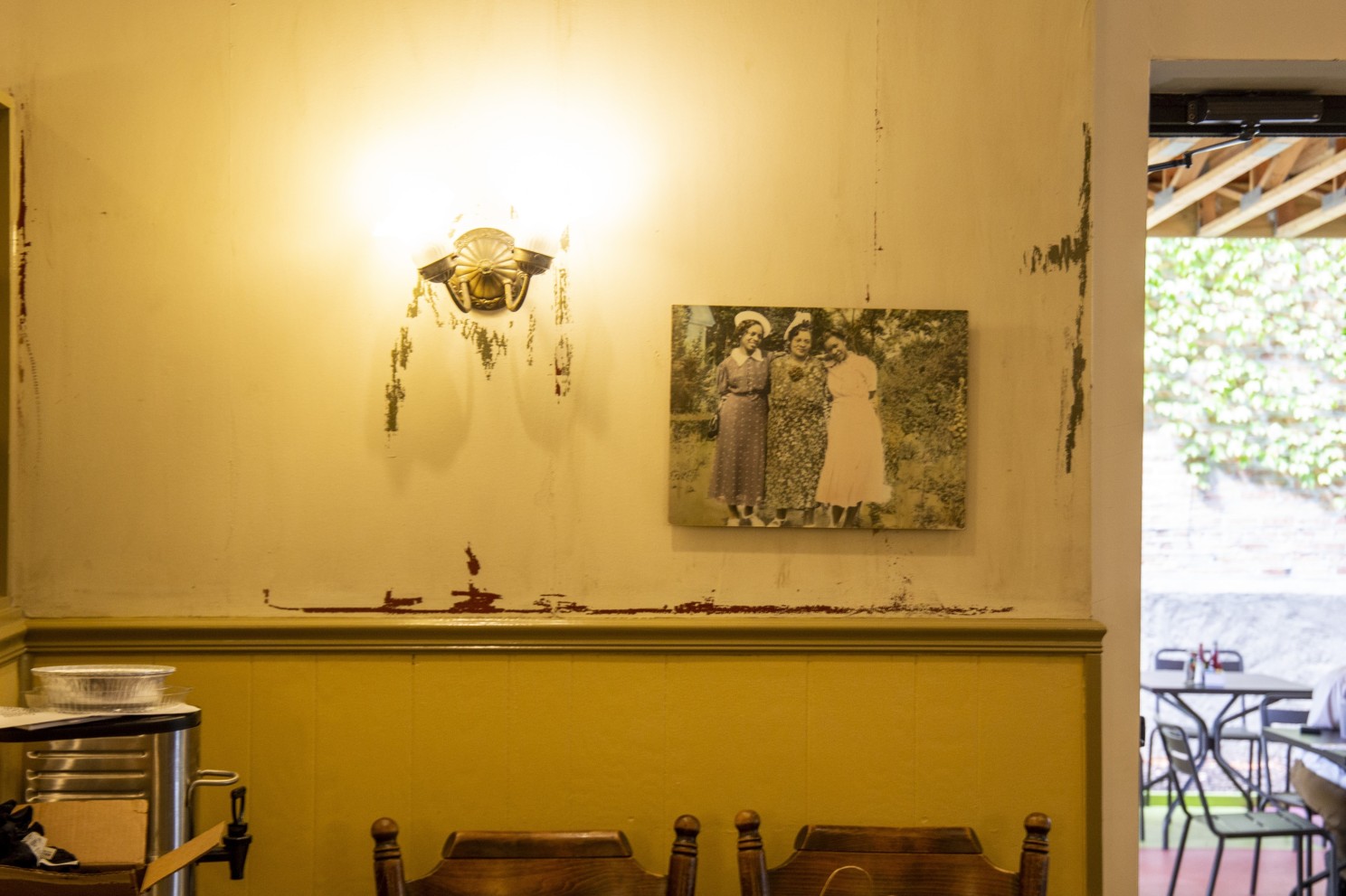
Simon Jacob: Sweet Maple Cafe, 20/09/2013 Chicago
Once again, as I conduct the interview and observe the patrons and staff, I wonder if the wonderful mother of two is even aware of what she has created in this Chicago neighborhood since founding the café in 1999. For me, as a foreigner trying to immerse myself in American society, whether in the country or in the city, the community of the café is like a wonderful family, the way the USA should be and often is. It shows me that while there are prejudices, problems and conflicts that need to be resolved, this is not true for all of Chicago and certainly not for the USA. Laurene has managed to convince a journalist from Europe, who has spent years in war zones in the Middle East, that American diversity can exist and thrive in the States. The Sweet Maple Cafe is the best example of this, because it embodies the best of the USA: community instead of prejudice and fear, in the midst of a large family that can overcome all dividing boundaries.
Sweet Maple Cafe - A delicious breakfast
Finally, I would like to mention that it was once my hungry stomach that led me to Laurene. Regardless of the charismatic personality of the owner, the more than friendly and extremely versatile staff, who, to the surprise of a Central European, engaged in a long and interesting conversation with me, I would like to mention the café's wonderful cuisine. Every time I'm in the USA, I fight a craving for sweet donuts, cakes and other delicious desserts. For health reasons alone, I try to avoid these admittedly delicious temptations, as the sugar content of many American dishes is simply far too high for Central European stomachs. I remember once, on a steamboat trip on the Mississippi during dinner, biting into a dessert that was very sugary by my standards and immediately putting it down again. It was simply not possible for me to try the locally popular dessert a second time. It was definitely too sweet for me. The food at the Chicago Café was a different story. Pancakes, cinnamon pastries and other desserts are sweetened only as much as necessary. The balance between the taste sensations is very well balanced. Everything goes together harmoniously. Even the savory dishes, be it a wonderfully prepared omelet, bacon or toast with butter, cheese and jam. At the Sweet Maple Cafe, everything is prepared with love, patience and a healthy dose of serenity.
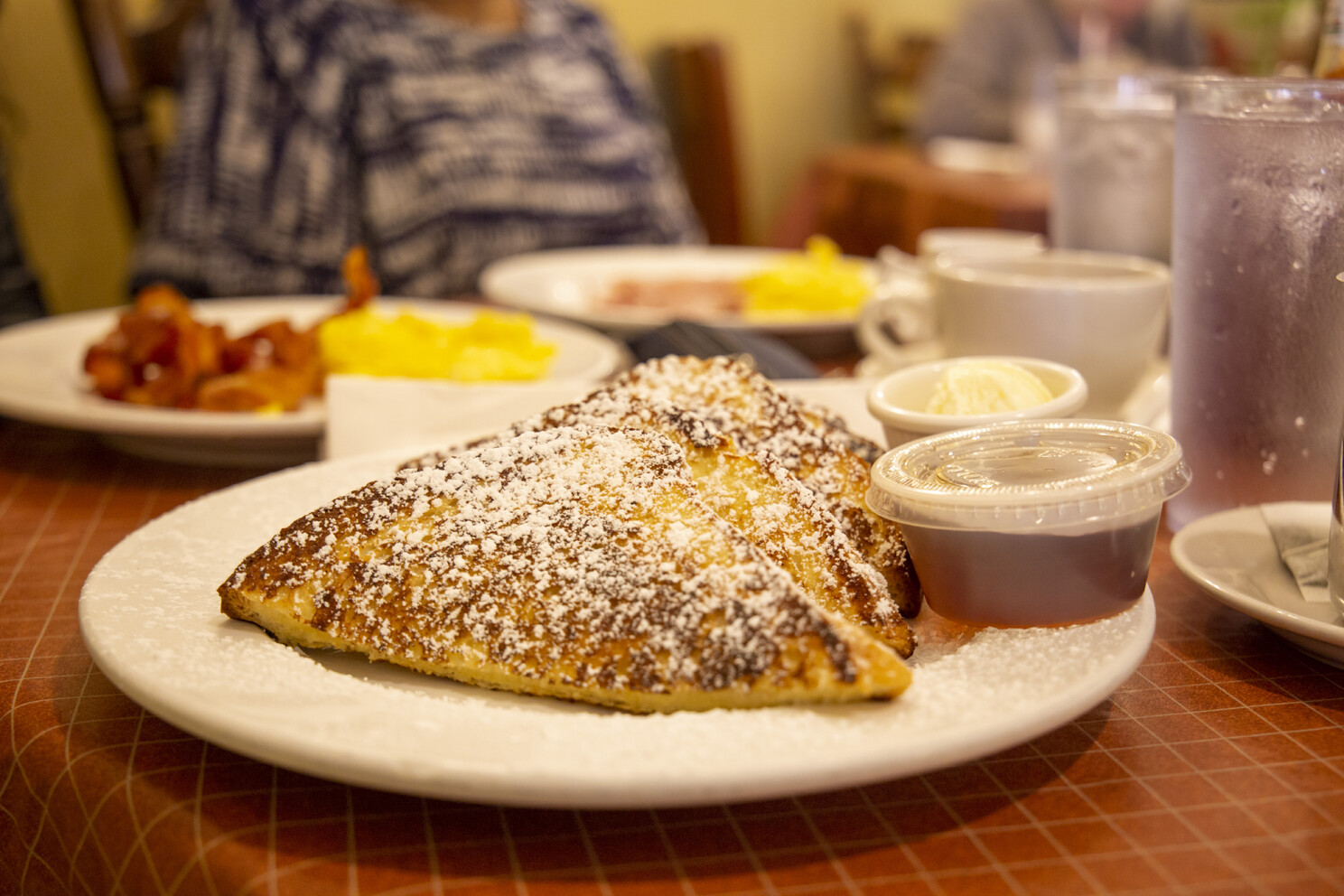
Simon Jacob: Breakfast at Sweet Maple Cafe, 09/20/2013 Chicago
And when you bite into the wonderful dishes of this fascinating lady who embodies Laurene, you wish a little that everyone in the world, especially those who argue, would meet at Sweet Maple Cafe, enjoy the food, take in the intense and benevolent aroma of the excellent coffee and simply talk to each other to breathe in the atmosphere that Laurene has created for the company.
When I asked her (Laurene) whether she was aware of the space she had created for the guests beyond the culinary offerings, she looked at me a little puzzled and answered my direct and serious question with the words:
"Well, it just came about like that... from my many experiences and the desire to lead a harmonious life with everyone around me. Based on respect, mutual recognition and without fear of each other.
Dear Laurene,
Thank you for having people like you. You have created a "place of culture" with the Sweet Maple Cafe. You and your team can be proud of that. And please, the next time you bake a cheesecake, make it with a German touch and with quark. See you next time.
Simon Jacob,
15th of December 2023, Germany, Augsburg


 Donation
Donation


